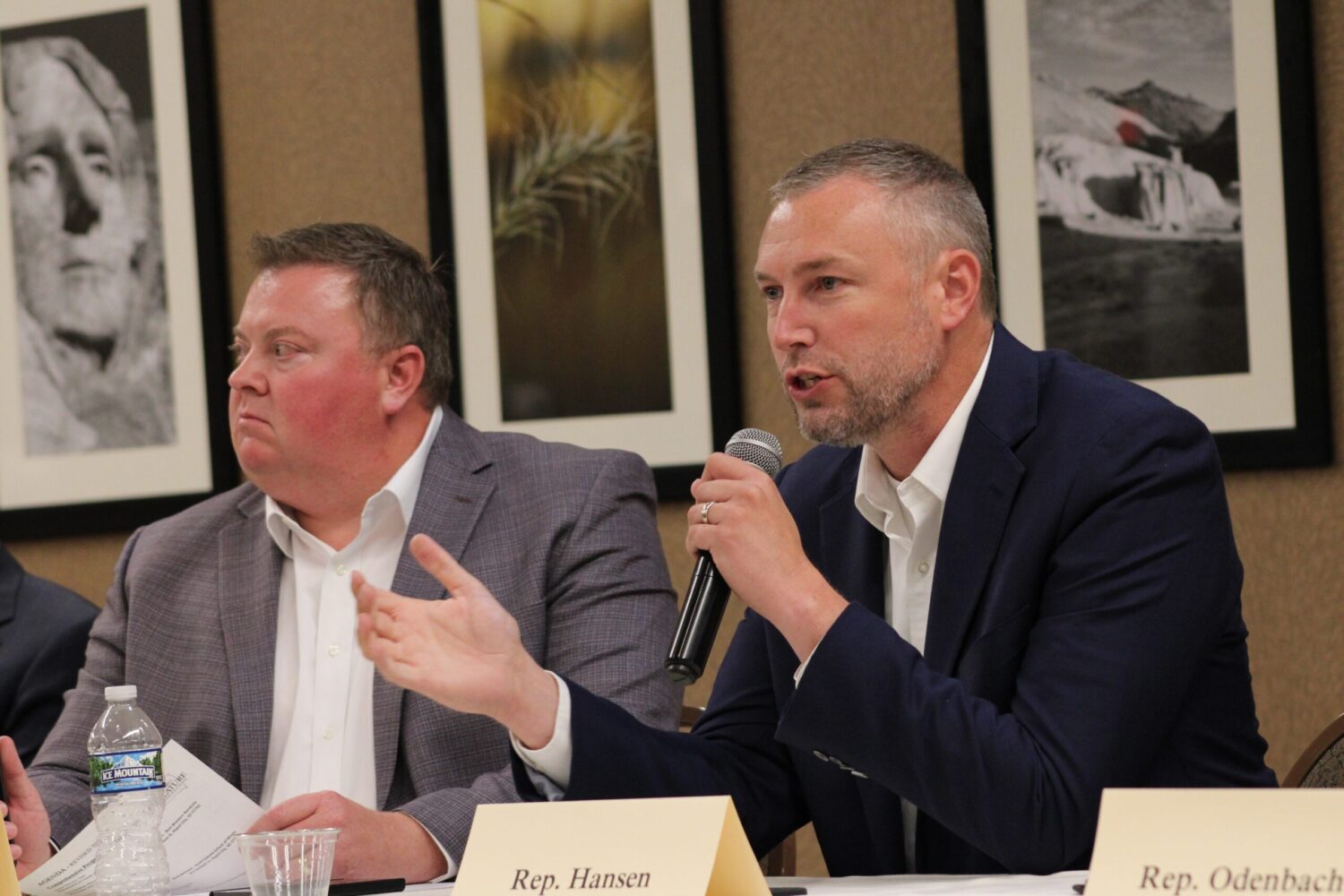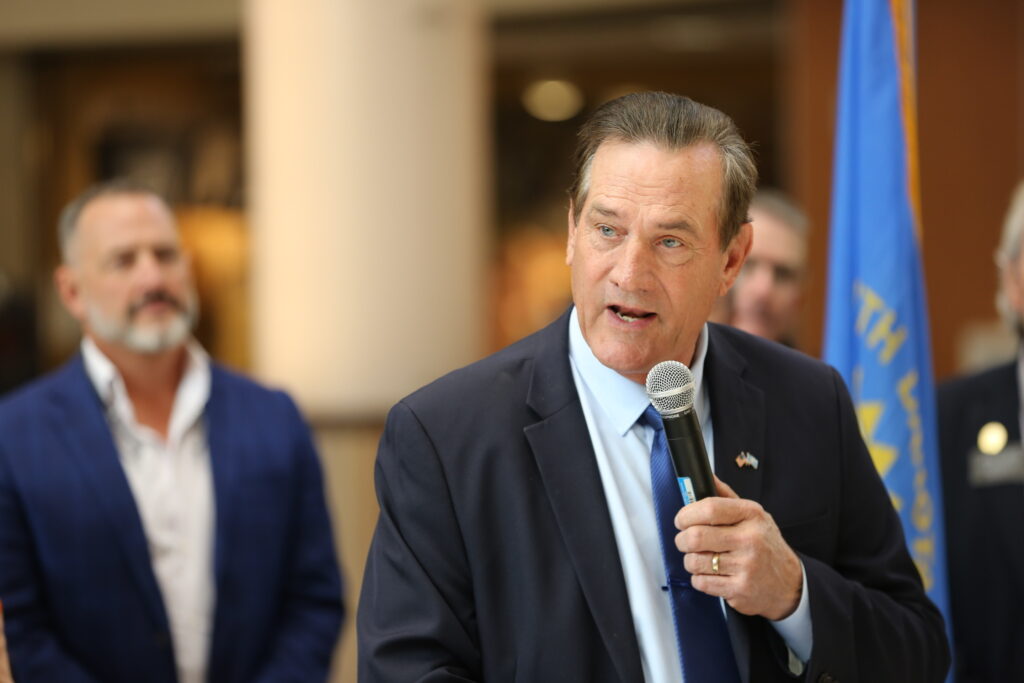Gov. Larry Rhoden speaks on Oct. 24, 2025, at the Sioux Falls Regional Airport in South Dakota while announcing a proposal to fund airport expansion projects. (Photo by Joshua Haiar/South Dakota Searchlight)
SIOUX FALLS — South Dakota Gov. Larry Rhoden and a group of legislators — including one seeking his job — made rival proposals this week to shift millions in state housing infrastructure funds to other purposes.
On Wednesday, a legislative task force working on property tax reduction advanced 19 ideas that could become legislation this winter. The ideas include taking the roughly $65 million remaining in the state’s housing infrastructure fund and pairing it with money from the state’s budget reserves to provide $500 individual property tax credits to homeowners.
On Friday, Rhoden said he wants to use $30 million of housing infrastructure money to offer interest-free loans of up to $15 million each for expansion projects at the Sioux Falls and Rapid City airports.
“We’ve seen huge increases in travelers coming through these airports,” Rhoden said while making the announcement at the airport in Sioux Falls. “With more gates, more flights, and more destinations, we’ll be able to draw more visitors.”
The plans require approval from legislators, who will gather in January at the Capitol in Pierre for their annual lawmaking session.
GET THE MORNING HEADLINES.
Both plans target the Housing Infrastructure Financing Program, which legislators and Rhoden’s predecessor, Kristi Noem, created in 2023. They used a mix of state and federal money to create a $200 million fund.
Awards from the program cover up to a third of a developer’s cost for things like roads, water-and-sewer lines, and sidewalks. The fund has supported 83 projects statewide, helping to create 7,360 single-family housing lots and 5,754 apartment or other multi-family units.
Half of the fund went out as grants. About $65 million remains from the other half, devoted to loans.
Rhoden wants to move the $65 million from the housing infrastructure fund to the state’s Revolving Economic Development and Initiative Fund, known as the REDI Fund. The $30 million could then be loaned to the airports.
Rhoden did not specify a use for the rest of the money, but in the REDI Fund it would be available for low-interest loans to start-up firms, businesses that are expanding or relocating in South Dakota, and local economic development corporations. REDI Fund loans are awarded by the state Board of Economic Development, whose members are appointed by the governor.
When asked about the shift in purpose for the money, Rhoden’s spokeswoman, Josie Harms, responded with a statement.
“It wouldn’t have been right to use these dollars sooner, before they had the opportunity to be used for housing development — but by now they have,” the statement said. “Most of the original $200 million was invested into housing, and what remains is currently sitting unused; therefore, adding no value to South Dakotans. It’s only right to invest these dollars so that they are actively adding value to our great state.”
Rhoden has not yet formally declared himself a candidate to keep his job next year, but he has published a campaign website and is seeking campaign contributions.
The idea to use remaining housing infrastructure money for property tax credits is from state House Speaker Jon Hansen, R-Dell Rapids, one of several declared candidates for governor in next year’s elections and a co-chairman of the property tax task force.
Rhoden criticized Hansen’s plan Friday.
“That proposal, quite frankly, has no merit,” Rhoden said, arguing that one-time credits would be a bandage approach to the ongoing problem of rising property taxes.
Hansen responded in a statement to South Dakota Searchlight.
“Families are getting hammered by high property taxes, and they remain my top priority,” Hansen said. “They need relief now — no more delays, no more excuses, and definitely no more of these budget swaps to fund pet projects.”

Rhoden has his own proposal to lower property taxes by giving counties — which currently can’t impose sales taxes — the option to levy a half-percent sales tax while using the revenue to lower or replace homeowner property taxes.
Meanwhile, an economic development official thinks the remaining housing dollars should stay where they are.
“We’re disappointed that the administration has turned away from the business of investing in housing infrastructure,” said Julie Johnson, an Aberdeen-area lobbyist for various economic development and housing groups. “These are very important funds in the world of housing development across the state.”
Last week, the president and CEO of the Minneapolis Federal Reserve Bank, Neel Kashkari, told a Rapid City audience that the best thing local governments can do for housing affordability is encourage more home construction.
“Localities need to look at what can you do locally to try to remove some of the barriers that are preventing more supply from coming in,” Kashkari said.


